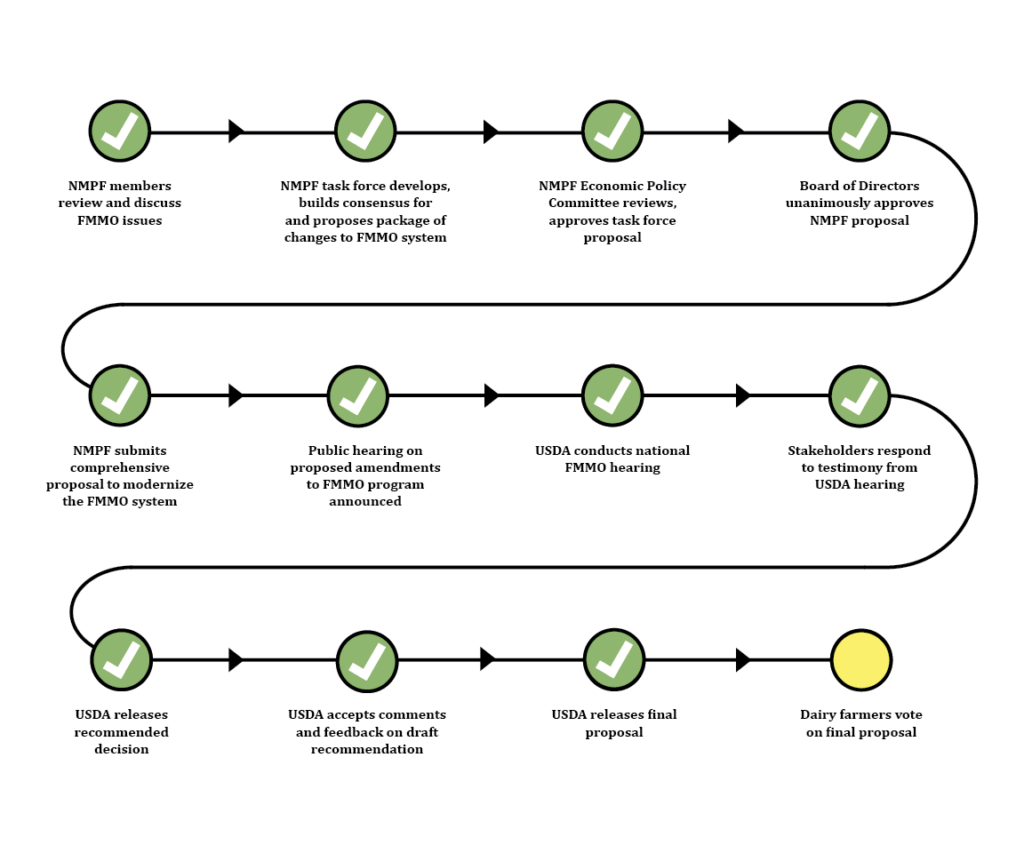- About
- Key Issues
Labor & Rural Policy
Sustainability
Animal Health
Nutrition & Food Safety
Labeling & Standards
- Programs & Resources
- Advocacy
- News
- Membership
- Events
- Stay Informed
- Contact
National Federal Milk Marketing Order Modernization
About
Beginning Aug. 23 in Carmel, Indiana, USDA began holding a public hearing to consider proposals to amend the Federal Milk Marketing Order (FMMO).
The FMMO system saw its last comprehensive revision in 2000. Since then, the structure of the U.S. dairy industry has shifted significantly, from product preferences and plant costs to the composition of milk itself. Calls to re-examine the federal order system intensified as a result of the COVID-19 pandemic, which strained the increasingly unwieldy system.
After more two years of in-depth analysis and examination of numerous FMMO issues by a dedicated team of technical experts from NMPF’s member cooperatives, NMPF’s Board of Directors unanimously approved a proposal to modernize the marketing-order system on March 7, 2023 and submitted it in final form on May 1.
Highlights of our proposed changes to the FMMO system include:
- Returning to the “higher of” Class I mover: The current Class I mover, which averages the Class III and IV monthly prices, carries an asymmetric risk versus the previous “higher of” calculation. This means dairy farmers are exposed to unlimited risk on the downside, while benefits to dairy farmers are limited on the upside. This asymmetric risk was exposed during the pandemic-induced market volatility that occurred during 2020. But even after the pandemic, the current mover has significantly underperformed the previous mover, including in 2022 as well.
-
Updating dairy product “make allowances”: Current FMMO make allowances have not kept up with the costs of manufacturing dairy products. NMPF is proposing an interim adjustment to the make allowance for all cheese, whey, butter and nonfat dry milk based on available plant-cost data while acknowledging that such data is itself incomplete and requires a separate solution.
-
Discontinuing the use of barrel cheese in the protein component price formula: Presently, the FMMO formulas weight cheese blocks and barrels about 50/50 in the reports to USDA’s weekly mandatory price survey. But that does not reflect the relative volumes of cheese actually produced and priced by these two forms of natural cheddar cheese. Eliminating barrel cheese from the pricing formula will better reflect the value of producer milk for manufacturing cheese.
-
Updating milk component factors for protein, other solids and nonfat solids in the Class III and Class IV skim milk price formulas: The component composition factors in the FMMO skim milk formulas have not changed since 2000. Since that time, the composition of these milk components has increased, causing a steadily growing understatement of the value of producer milk in all four classes in the four fat-skim pricing orders and Class I milk in all orders.
-
Updating the Class I differential price system: The current FMMO Class I differentials have—for the most part—not changed since they were first implemented in 2000, while the cost of delivering bulk milk to fluid processing plants has increased. As a result, the current Class I differentials have become increasingly inadequate to effectively supply milk for fluid use and are thereby creating disorderly marketing conditions.
We are also pursuing two other components of the overall NMPF package that don’t involve changing federal order regulations outside of the hearing process. The recommendations, which remain essential parts of NMPF’s modernization plan, are:
- Extending the current 30-day reporting limit to 45 days through federal rulemaking on forward priced sales on nonfat dry milk and dry whey to capture more exports sales in the USDA product price reporting: Increasing the number of reporting days on these two products will increase the representation of exported volumes of both nonfat dry milk and dry whey while keeping the reporting limit narrow enough to ensure the reports represent current prices.
-
Seeking the authority in the farm bill to ensure the make allowances are regularly reviewed through mandatory plant-cost studies every two years: This would provide information necessary for the industry to consider updating make allowances based on more accurate and up-to-date data. Current FMMO make allowances have not changed since 2008, while costs of manufacturing dairy products used in the FMMO component price formulas have increased. The problem of maintaining proper make allowances in the FMMO pricing formulas is exacerbated by the persistent lack of accurate information relative to costs of manufacturing dairy products. Requiring USDA to conduct regular, mandatory, and auditable plant cost studies and report the results would provide stakeholders with the information necessary to consider requesting hearings to further update make allowances based on accurate and current data.
More Information
- FMMO Modernization Hearing Request and Proposal, NMPF
- Federal Order Modernization Summary, NMPF
- FMMO Modernization: What’s Next Webinar, NMPF
- An Overview of the Federal Milk Marketing Order Program, USDA
Copies of the hearing notice, guidelines for how to participate, the hearing schedule, and the corresponding hearing record will be made available on USDA’s Hearing Website.






